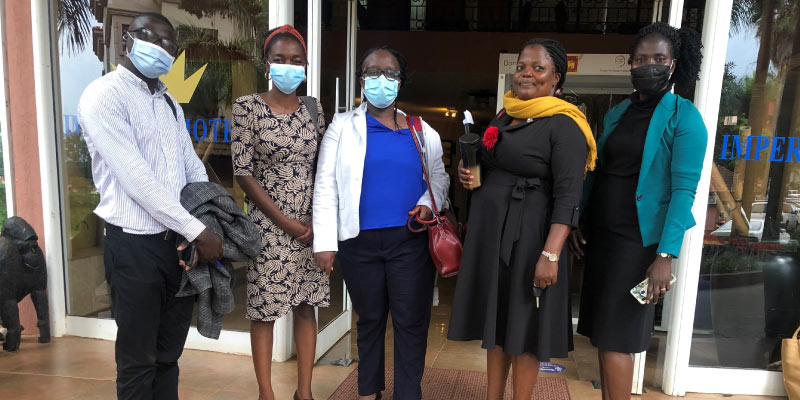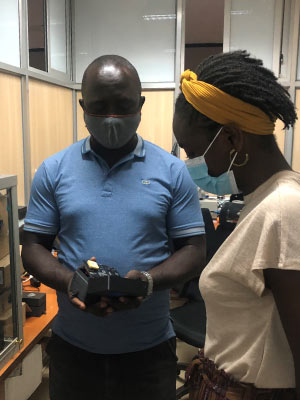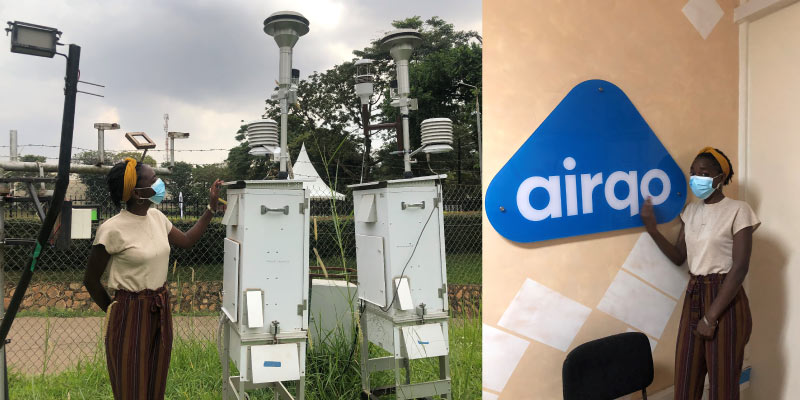
A Nelson Institute student-led project investigating air quality in the capital city of Kampala, Uganda is receiving high-level national attention and is contributing to the first Kampala Clean Air Action Plan and the National Environment Air Quality Standards and Regulations.
This project is the result of the Nelson Institute spring 2021 capstone course, Air Quality and Equity in an African City. In line with the Wisconsin Idea, a guiding principle that suggests education should influence people’s lives beyond the boundaries of the classroom, students in the capstone course partnered with leaders in the capital city of Uganda, Kampala, to move air quality policy forward. Throughout the course, students analyzed common sources of urban air pollution, examined the health and ecological impacts of these pollutants, and considered how these pollutants impact the most vulnerable communities in Kampala.
The course was developed and taught by Nelson Institute doctoral candidate, Dorothy Lsoto, and Nelson alumna and associate director for the University of Wisconsin-Madison African Studies Program, Aleia Ingulli McCord. Lsoto was the inaugural recipient of the Nelson Institute’s Capstone TA competition.
“Dorothy’s academic training and life experience prepared her perfectly for undertaking this important effort, and the outcomes of this course speak for themselves,” said McCord. “The classroom became a space for practitioners, students, and scholars to investigate the root causes of pollution in Kampala, and the work that students produced is actually being used by stakeholders in Uganda.”
Lsoto, whose hometown is Kampala, Uganda, is proud to be a part of this project which aligns well with her current research studying the relationships between air quality and health. Under the advisement of Nelson Institute professor and Global Health Institute director, Jonathan Patz, Lsoto is working towards her PhD in Environment and Resources, a degree which she hopes will help her to achieve her childhood goal of helping her community and family.
They love the interdisciplinary approach of the Nelson Institute… Many of the stakeholders are talking to me about how to adopt that interdisciplinary approach.
– Dorothy Lsoto
“As a young kid I grew up in the city of Kampala, but my grandparents were in the countryside with no electricity. They used firewood to cook and one day I visited my Grandma who was tearing up while she was making tea,” shared Lsoto. “I remember asking my mom why Grandma was crying and I learned it was the smoke from her stove. Imagine a small kitchen with no windows with dark tar on the walls. As a kid that image stayed with me.” This commitment to understanding the relationships between energy and health followed Lsoto through her years at Makerere University in Kampala, at the Center for Research in Energy and Energy Conservation, and then in her work with several renewable energy and cookstove start-ups in Kampala.
Lsoto began her graduate education at the Nelson Institute studying renewable energy in East Africa, for which she was awarded the Energy Analysis and Policy (EAP) International Student Scholarship in 2018. Her work focused on biogas and other renewable sources that could assist those like her Grandma who were reliant on firewood. The work also supported women in the area who often spend many hours gathering firewood, limiting their ability to pursue other interests. Upon completion of her master’s project, Lsoto remained interested in the pollution caused by energy sources such as firewood, so she decided to focus on air quality and its impact on health for her doctorate work.
“Unfortunately, I never got to help my grandma as she died of respiratory related illness. But, that’s why I wanted my PhD to focus on health and air quality,” said Lsoto.
All of Lsoto’s personal research provided her with the perfect background to lead this class, which required her to coordinate communication between the students and leaders in Kampala. During the course, student groups worked with at least two stakeholders from both government and private institutions in Kampala to better understand the air quality challenges presented by various sectors such as transportation and industry. Likewise, Lsoto worked closely with the stakeholders to better understand their needs and how the student work could best support Kampala’s air quality policy plans.

“These are not your everyday people,” said Lsoto. “They work for some of the top organizations in Uganda, including the National Environment Management Authority (NEMA).” The relationships Lsoto and her students formed with leaders in government and the private sector, including with AirQo, a start-up based in Kampala that offers rapid, low-cost air quality monitoring, allowed her to continue to work in the air quality sector after the semester ended. “Because of this course, I was invited to be a part of the first Kampala Clean Air Action plan and the National Environment Air Quality Standards and Regulations formulation and review”
The reports that students in the class authored are now being used to inform the Kampala Clean Air Action Plan and the National Environment Air Quality Standards and Regulations.
“Dorothy’s work demonstrates the transformative impact of an interdisciplinary education from the Nelson Institute,” said McCord. “Her vision for a clean air future in Kampala is guided by the science of air pollution, principles of public health, the history of urbanization and legacies of colonialism, and a practical understanding of modern politics. Decision-makers in Kampala are taking notice.”
Indeed, Lsoto shared that the community leaders continue to be impressed with the quality of the work the students submitted and the interdisciplinary approach used in the course and throughout Nelson Institute curriculum.
“They love the interdisciplinary approach of the Nelson Institute,” Lsoto shared. “They had never seen this and were very surprised that the background of the students was so diverse. Many of the stakeholders are talking to me about how to adopt that interdisciplinary approach.”

Lsoto will continue to work with stakeholders on the Kampala Clean Air Action Plan, which will become the framework for other regions in the country while she also provides input to the National Environment Air Quality Standards and Regulations set to come out later this year. While this is just one step forward in air quality policy, Lsoto is also one step closer to helping her community and honoring her goal of helping those like her grandma.
“It’s been a good experience,” Lsoto said. “I’m especially excited that this is the first extensive research done sector-by- sector on the air quality in Uganda.”